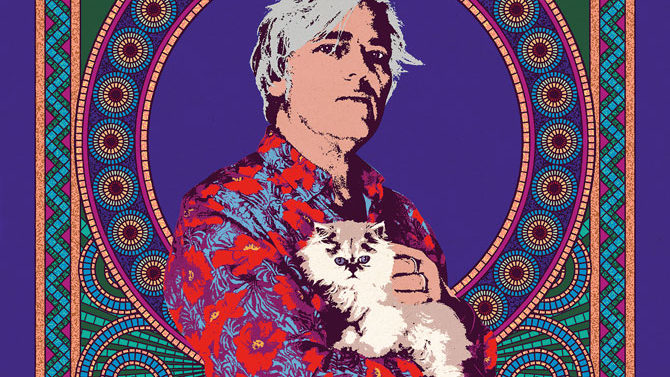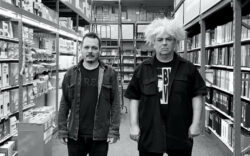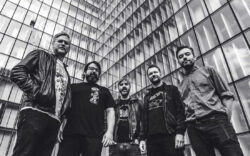Immortalized in saintly hues of blue and red, Robyn Hitchcock stares back from the cover of his self-titled 2017 album with psychedelic majesty. His color-saturated likeness glows with pride over a particularly inspired chapter in an already accomplished career.
“I got a good crop [of songs] on this record—so good that I thought I’d name the record after myself,” Hitchcock says in an email, punctuating his words with a tell-all smiley face emoji.
In 2015, the singer, songwriter, guitarist and musical journeyman relocated from the U.K. to Nashville, TN. There in Music City, where Hitchcock resides with his partner, Australian-born country singer Emma Swift, he assembled his latest album. From the first few percolating strums of his steel strings, Hitchcock crafts a distillation of the musical terrain that has inspired him for nearly 40 years, returning to the dynamics of electric guitars, bass and drums underscoring three-part harmonies.
But inspiration, it seems, comes from all walks of life. Take a closer look at the album’s cover, where Hitchcock’s heroic gaze is quietly bested by the small, fluffy cat he cradles in his arms.
“That was Tiny, our cat—Emma’s and mine,” he says. “Tiny was a beautiful, doll-faced Persian who lived barely six months; she had a very strong personality and left a crater in our lives when she went. But everybody does go, don’t they, so we should try to accept it before we go, too.”
Tiny’s placement is a heartfelt homage to Hitchcock’s pensive muse. It’s also a visual cue that gives abstract depth to the album’s opening number, “I Want to Tell You About What I Want,” when he sings, “We’re replacing ourselves with artificial thought… And that could could be our legacy/ Before the feline dynasty scampers over history.”
Hitchcock first caught the world’s attention in the late ’70s, fronting Cambridge, England’s neo-psychedelic rockers the Soft Boys. Critical acclaim followed amid the boom of Reagan/Thatcher-era alternative rock, while leading his group the Egyptians. Albums such as 1985’s Fegmania! and 1986’s Element of Light yielded surrealist rock singles such as “The Man With the Lightbulb Head” and “If You Were a Priest.” Hitchcock has released scores of albums since, and worked with filmmaker Jonathan Demme for the 1998 documentary Storefront Hitchcock. Over the years, he’s collaborated with Smiths guitarist Johnny Marr, Gillian Welch and Dave Rawlings and R.E.M.’s Peter Buck in the mid-aughts group the Venus 3, forever keeping one foot planted in sincerity and the other in his singularly quirky sense of humor.
The Deep South has always been good to Hitchcock—particularly Athens. He recalls his earliest memories of performing in the Classic City in spring of 1988. “We played the old 40 Watt, back when it only had one lightbulb,” Hitchcock recalls. “I was with my band the Egyptians, supplemented by Peter Buck, who very kindly collected me from the Atlanta airport in his hearse.
“This was my first visit to Athens, and the R.E.M. family was very welcoming,” he says. “They were all still living in town then, and their fame was taking it with them… I didn’t know what to expect, but there was the feeling that we were in the embrace of a multi-headed organism.”
For his performance Friday—part of Camper Van Beethoven’s annual three-day Camp-In—Hitchcock’s set will feature songs from throughout his career, partially performed solo and partially with a full band featuring Elf Power’s Andrew Rieger, Peter Alvanos, Davey Wrathgabar and Matt Garrison.
This is the first time Elf Power and Hitchcock have shared the stage, but Rieger’s admiration for Hitchcock’s songwriting runs deep. As far back as 1994, Elf Power has performed a cover of “Surgery,” from Hitchcock’s acclaimed 1985 live recording, Gotta Let This Hen Out!.
“We are huge fans of his,” Rieger says. “The chord changes and arrangements always offer something unexpected, and lyrically he’s great at mixing direct, emotional lines with abstract, surreal imagery, often within the same verse. He also possesses the rare gift of being able to inject a bit of humor into a song, without coming off as silly or jokey.”
Hitchcock’s eccentricities dive headlong into nostalgia in “Raymond on the Wires,” a eulogy for his father, novelist and screenwriter Raymond Hitchcock. Through it all, his reverence for life and death is powerfully affecting, so much so that this self-titled album is as much about Hitchcock as it is a lament for those who have influenced him, human or otherwise.
“I felt like Tiny helped me finish the last few songs on the record,” Hitchcock says. “Nothing I’ve written since she went has been that good.”
Like what you just read? Support Flagpole by making a donation today. Every dollar you give helps fund our ongoing mission to provide Athens with quality, independent journalism.










